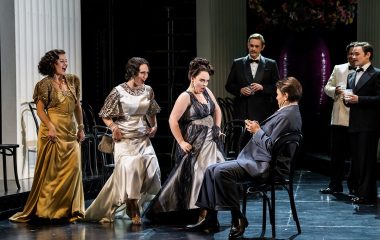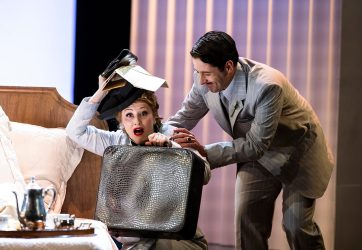 United Kingdom Puccini, La rondine: Soloists, Chorus and Orchestra of Opera North / Kerem Hasan (conductor). Lyric Theatre, The Lowry, Salford Quays, 17.11.2023. (MC)
United Kingdom Puccini, La rondine: Soloists, Chorus and Orchestra of Opera North / Kerem Hasan (conductor). Lyric Theatre, The Lowry, Salford Quays, 17.11.2023. (MC)

Puccini has three operas in the recent top ten of most performed operas La bohème, Tosca and Madama Butterfly, and some Puccini admirers consider Turandot as his finest work. Puccini’s opera La rondine has never had the same popularity as those celebrated works. I have long considered La rondine (The Swallow) to be an impressive and greatly underrated, middle-period opera. Whilst there are signs of its increasing popularity La rondine is certainly worthy of more attention than it currently receives. It was over a couple of decades ago at Bradford that I saw Opera North’s previous production of La rondine yet I recall little apart from male cast members wearing straw boaters and bold striped blazers.
Many of Puccini’s librettos are based on acclaimed plays or novellas, such as the quartet of operas mentioned above, yet La rondine does not follow that pattern. Its origin was unusual as Puccini received a commission not for an Italian opera but for a Viennese operetta with a German libretto that was written by Alfred Maria Willner and Heinz Reichert as Die Schwalbe (The Swallow). Following a disagreement with publishers Puccini engaged Giuseppe Adami to rework the Die Schwalbe libretto into an Italian opera that became La rondine. The opera libretto, concerning both middle- and working-class characters, can still be regarded as being part of the realistic style known as verismo. After the 1917 premiere given at Monte-Carlo, Puccini wasn’t satisfied with the libretto’s ending and wrote two further versions. This Opera North production gave the original 1917 version, albeit with some alterations to the vocal lines in the first act.
With Puccini exploring some new ideas the music of La rondine is untypically lighter and the libretto leaves a ‘bittersweet taste’ seeming to straddle operetta and ‘serious’ opera. Maybe some dismiss the opera for an ending that leaves room for conjecture. Stage director James Hurley has chosen to set this production in the 1930s era, focused on the fashionably stylish aspects of the highly romantic café society of Paris and I am so glad he didn’t resort to using a brashly decadent concept.
Magda’s fashionable salon in Montmartre, Paris in Act I was the best set to enjoy the visual spectacle created by set designer Leslie Travers and clothing designer Gabrielle Dalton. Travers excelled with his vividly chosen colourful sets, decorated in an art-deco style available to the wealthy in Paris. The designer’s love of flower displays was evident too. Gone is the rather predictable women’s 1920s flapper era, evening wear having shorter dresses decorated with sequins and fringes. Dalton matched the 1930s era strikingly with subtle and stylish evening/cocktail dresses in slightly metallic colours; silver, oyster and gold. Of course, the men wore the timeless style of black or grey dinner suits with widish lapels.
Briefly the plot concerns Magda the courtesan and devoted mistress to wealthy banker Rambaldo. A palm reading predicts Magda will discover true love and migrate south like the swallow (la rondine), yet always return. Magda reflects longingly on the freedom she had as a young woman when she was free as a bird. During a cocktail party at their elegant Paris salon Magda meets the visiting Ruggero and they become lovers. The couple elope to the French Riviera. Their relationship is in trouble as Magda is still hiding her past incarnation as a courtesan from Ruggero and they have money troubles. Not feeling respectable enough to marry Ruggero she leaves the villa. Like a swallow flying home Magda likely returns to the Paris she knows and to Rambaldo. Ruggero is inconsolable.
Russian soprano Galina Averina is no stranger to the role of Magda, acting and singing her role with a combination of style, confidence and personality. Her big hit aria Chi il bel sogno di Doretta where Magda explains how gold doesn’t bring happiness, was delivered splendidly by Averina with dignity, ample emotion and only a little strain. Male lead Ruggero is from a family friendly with Rambaldo. It is often said how the role is insufficiently developed and I tend to agree. Ruggero is sung by French tenor Sébastien Guèze and I enjoyed his short aria Dimmi che vuoi seguirmi as Ruggero is singing to Magda of an idyllic scene where they would live together and maybe have children. Guèze’s tenor was quite well controlled, and he completed his high notes efficiently, although I felt his tone lacked colour.

A significant role, the poet Prunier, lover of Lisette, was taken by Welsh tenor Elgan Llŷr Thomas. Lancashire lass Claire Lees sang the role of Lisette, as a rather cheeky, fun loving maid to Magda. Their duet T’amo… Menti! was performed with freshness and charm by Thomas and Lees. It was a lovely moment that felt like a convincing expression of love. The wealthy banker Rambaldo, although a significant presence, has minimal material. Philip Smith took the part of the mustached, rather sullen sugar daddy, notably seen in his black dress coat with broad astrakhan collar.
Kerem Hasan conducted with an assured sense of tempi and approach with the Orchestra of Opera North responding with splendid musicianship. Coached by Anthony Kraus the Opera North chorus was closely knit, especially enjoyable in the ensemble Nella dolce carezza. Compelling for its creative movement and routines, the six strong dance troupe were choreographed by Lauren Poulton.
For La rondine director James Hurley and his creative team coalesced with a talented cast providing such wonderful entertainment. Written by Puccini in war-troubled times the Opera North performance felt like a balm for our troubles today.
Michael Cookson
Creatives:
Stage director – James Hurley
Set designer – Leslie Travers
Costume designer – Gabrielle Dalton
Lighting designer – Paule Constable & Ben Pickersgill
Choreographer – Lauren Poulton
Cast:
Magda – Galina Averina
Ruggero – Sébastien Guèze
Lisette – Claire Lees
Prunier – Elgan Llŷr Thomas
Rambaldo – Philip Smith
Yvette – Pasquale Orchard
Bianca – Kathryn Sharpe
Suzy – Laura Kelly-McInroy
Périchaud – Ross McInroy
Goblin – Satriya Krisna
Crébillon – Paul Gibson
Rabonnier – Andrew Randall
Gabriella – Charlie Drummond
Lolette – Molly Barker
Gabriella – Amy Freston
A Voice – Gillene Butterfield
A Landlord – James Davies
Dancers – James Aiden Kay, Rose Ellen Lewis, Ruby Portus, Ben Yorke-Griffiths, Jonny Aubrey-Bentley, Erica Mulkern
Note: This autumn The Opera North – Green Season includes the three operas Falstaff, Masque of Might and La rondine which are all sustainable productions. Opera North is striving to reduce its carbon footprint and environmental impact with the aim of being carbon neutral by 2030 and inspire wider change towards a more sustainable future.
